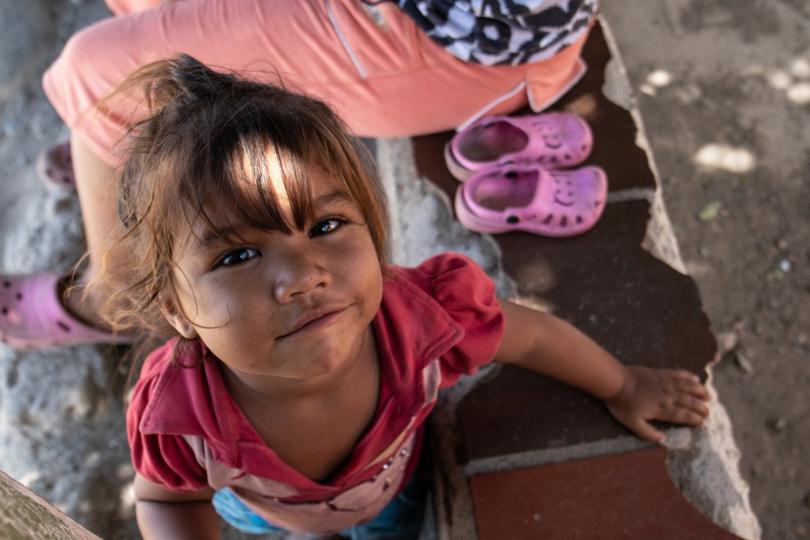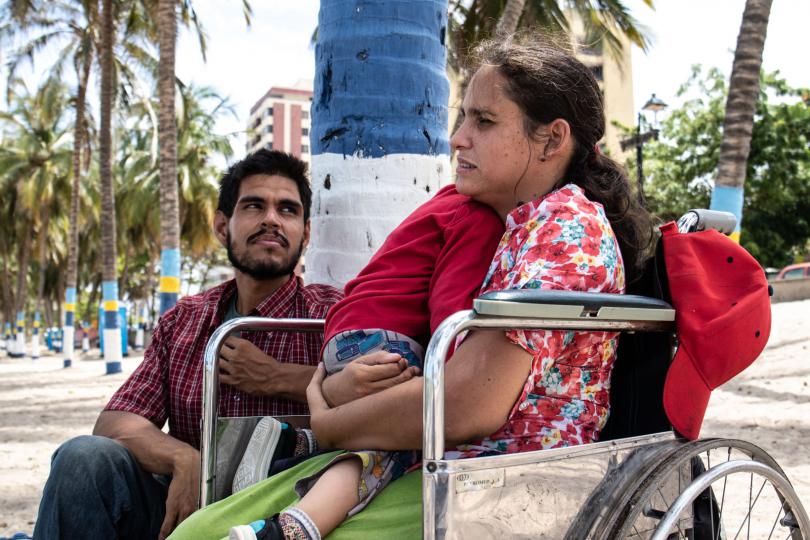Venezuelan migrant crisis: From Iraq to Colombia, human suffering is the same everywhere

by Sacha Myers, Emergency Health Unit Media & Comms Specialist.
As I flew into Colombia, I couldn’t help but look back at the previous nine months I had spent in Iraq. Nine months of recording stories about people losing homes, limbs and loved ones.
How would the violent upheavals of the Middle East compare to a less-known emergency in South America?
I was joining an assessment team from Save the Children’s Emergency Health Unit. Our job in Colombia was to assess and document the health needs of children and adults who had fled from Venezuela – a country wracked by economic and political woes.
Our first stop was the small dusty city of Cucuta, close the border and bursting with Venezuelans who had sold everything to make the dangerous journey in search of a better life.
But even as the plane touched down I couldn’t get Iraq out of my head. And the niggling question: ‘Will this be as bad as Iraq? Is the suffering on the same level?’
Hunger made us leave
During the next 10 days, I interviewed numerous families in three different locations along the border.
Hunger. This is the first thing that people said when I asked them why they left Venezuela.
A mother called Vanessa said: “When your daughter says she’s hungry and you don’t have food to give her, you have to make a decision to go.” She said one potato in Venezuela cost a week’s worth of wages.
One potato. I still can’t wrap my head around this. How can you possibly feed your children when food costs this much? The short answer: you can’t.
The whole family – including Vanessa’s two-year-old daughter – was suffering from malnutrition when they arrived in Colombia. Her husband was so weak that he could barely walk.

Vanessa’s daughter Lusanna was malnourished when she arrived in Colombia. Photo: Sacha Myers/Save the Children
Sleeping on the streets
Like many Venezuelan migrants, Vanessa and her family sleep on the streets in Colombia. They don’t have a choice.
People often arrive with just the clothes on their backs or a few small bags -if they’re lucky. Most have no money and are forced to sleep on the street, in carparks or basic buildings in very cramped conditions.
I meet Rosangela, Geomar and their two-year-old son on the beach after they had spent a rough night sleeping under a shop porch. It was 6:30am and Rosangela was expertly cutting her husband’s nails. The act was loving and intimate. I admired their fight to maintain a sense of dignity in the face of utter destitution.
“We’ve been here for two months. We sleep where we can find a place to sleep. We didn’t expect it to be so difficult,” Geomar told me.
Rosangela shifted uncomfortably in her wheelchair – the result of an accident when she was 15 – as her husband explained their situation. I could tell from the exhaustion etched on her face that the situation was becoming unbearable.
Without a place to stay, Geomar cannot go out and find work because he has to look after his son. And without work, they cannot afford a place to stay. It’s a vicious cycle with seemingly no end in sight.

Geomar and his wife Rosangela sit on the beach after another night sleeping on the streets. Photo: Sacha Myers/Save the Children
Children dying in hospitals
Geomar broke down in tears when he described how his country is collapsing.
In our local hospital in Venezuela, 150 children died because they didn’t have the medicine to treat them and because their parents didn’t have the money to pay for it,” Geomar said. “All the doctors have left the country so the medical treatment is very poor. If your son gets sick, he dies. It’s as simple as that.”
Migrants and returnees face multiple health issues due to months and years without medical care in Venezuela.
People with conditions such as high blood pressure, HIV, cancer and diabetes are in urgent need of medication and treatment. Pregnant women told me they never went to the doctor in Venezuela because they could not afford check-ups or ultrasounds.
But in Colombia, access to healthcare is a challenge for Venezuelan migrants too. The health system is overwhelmed with the increased demand for services and cannot cope. Even Rosangela cannot get a new wheelchair or access medication to treat her son’s fever.
Aurimar is seven months pregnant and has never had a check-up or ultrasound. She’s in Colombia to try and access healthcare. But she has to choose between medical care and buying food for her children. Photo: Sacha Myers/Save the Children
Suffering is suffering everywhere
It didn’t take long to get an answer to my question: even though there aren’t any bombed hospitals or war-wounded patients, the suffering of Venezuelan migrants and Colombian returnees is still unbearable.
I know there so many other emergencies around the world. So many children suffering. But the Venezuelan migrant crisis has continued unnoticed – or purposely ignored – for months.
With 1.5 million migrants and returnees in Colombia, and thousands more who have entered through unofficial border crossings, it’s time for action – and funding. Otherwise, the crisis risks destabilising Venezuela’s neighbouring countries and turning into a large-scale catastrophe.
******
Save the Children is responding to the Venezuelan migrant crisis in two locations on the Colombian/Venezuelan border. We have constructed four Child Friendly Spaces where we provide psycho-emotional support, recreational activities and child rights sessions for children. We have distributed water filters, solar lights and hygiene kits for families who arrived in Colombia without any possessions. To support schools with expanding classroom sizes and integrating Venezuelan children into schools, we have distributed school and teacher kits, and we will soon train teachers in classroom management, integration and providing psychosocial support for Venezuelan children.
Save the Children’s Emergency Health Unit conducted an assessment in September 2018 and will soon launch a health response focusing on sexual reproductive health and primar


